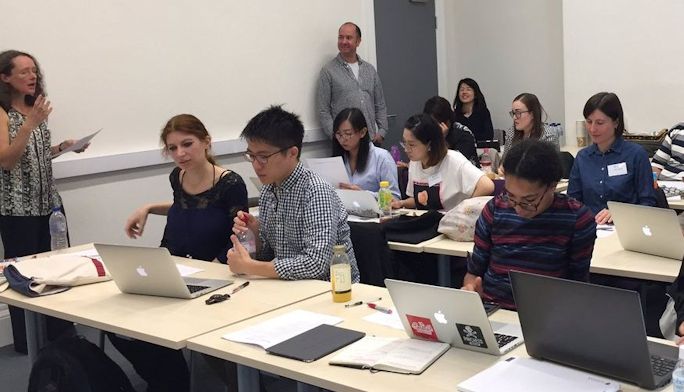The Renkei PAX workshops: the relevance of commemoration and remembrance for contemporary global challenges
by Professor Alex Balch, University of Liverpool
The two PAX workshops put together by Ritsumeikan University and Liverpool University in 2016 and 2017 and funded through the Renkei network have provided an excellent platform for collaborative work on interdisciplinary approaches to global challenges. They were designed to help early career researchers from across the world to exchange ideas about innovative and cross-disciplinary approaches to addressing the most pressing transnational and international issues we face. The workshops each adopted a different focus: war and conflict in the first workshop, slavery in the second workshop.
Image: The RENKEI PAX Workshop at Liverpool University, August 2017
Together, these events allowed newer and more established academics to jointly identify common political and policy challenges and begin to explore new and original solutions. The workshops featured an enormous range of discussions, but one of the key outcomes was the emergence of fascinating parallels between UK and Japan around the importance of the relationship between history and memory, and how these speak to questions of empire, nationalism and populism that while apparently relating to events of previous centuries are also intensely present in today’s political environment. The workshops also featured conversations about the value of interdisciplinarity and how the sciences and arts and humanities can speak to each other to address broad areas of knowledge like ethics, global capitalism and sustainable development.
The second workshop was organised around the commemorations that took place on August 23rd 2017 in Liverpool for Slavery Remembrance Day. The events in 2017 were special for many reasons. This year was the 10th anniversary of the inauguration of Liverpool’s International Slavery Museum. Many of us present were from the PAX workshop and some had travelled thousands of miles to participate and witness the walk of remembrance and the libation ceremony on the Albert Dock.
This year Chief Angus, who led the libation ceremony, was keen to point out that slavery is still with us in the contemporary era. His words proved to be portentous. Only a few months later a report by CNN brought this to sharp focus with images from Libya showing Nigerian migrants being ‘sold’ in what looked very similar to a slave auction. The story brought home the horrific reality of contemporary forms of enslavement. It also served as a reminder of the way Europe and Africa are interlinked – in particular, the horrific human cost of Europe’s policies of ‘remote-controlling’ immigration policies, and the opportunities for exploitation that now exist in post-conflict zones such as Libya. The story led to demonstrations organised by #FreeMyTribe in Paris, Stockholm and New York, joined by celebrities where protestors demanded: “Free our brothers!”
Most people with any awareness of Liverpool’s role in the transatlantic slave-trade will understand why the annual commemorations happen here, but less people are aware why the specific day was chosen. The reason is that 23rd August 1791 is a date associated with the Haitian uprising of enslaved Africans against French colonial rule in what was then called Saint-Domingue. As with the work of the ISM itself, the commemorations allow us in Liverpool to reflect on all those millions of lives enslaved, but also their acts of resistance and the subsequent achievements of the African diaspora.
Chief Angus’ words echoed the UN’s new Sustainable Development Goals (SDGs) which have urged action to “eradicate forced labour, end modern slavery and human trafficking” (SDG 8.7). If these ambitions are to be achieved, Universities (and the new generation of thinkers they nurture) must play a key role in providing the right kind of evidence and research to inform policy development. They must also be inclusive and reach out to draw in and learn from those who are leading resistance, to help facilitate wider engagement – across different communities societal actors and stakeholders. The PAX workshops provided a valuable platform for this kind of work to take place, and now we are ready to continue our work building on this success to incorporate new partners and events in the future to build on the network through new collaborative funding applications, sustaining the relationships we have already established through a sustained knowledge exchange.
